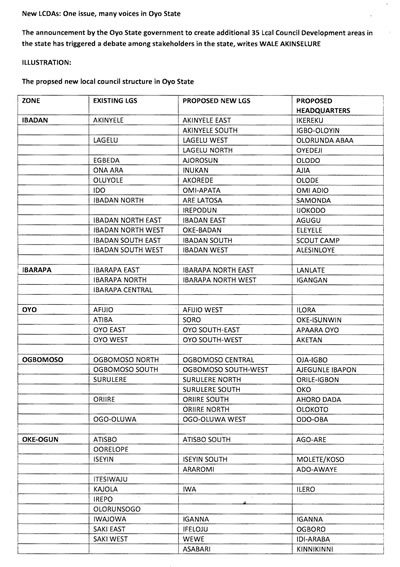The announcement by the Oyo State government to create additional 35 Lcal Council Development areas in the state has triggered a debate among stakeholders in the state, writes WALE AKINSELURE.
Last week, Oyo State hit the front burner again, following an announcement by the Chief of staff to the state governor, Dr Gbade Ojo, that the administration of Governor Abiola Ajimobi, had resolved to implement the gazette No. 23, Vol. 27, August 13, 2002, which recommended the creation of additional 35 local council development areas (LCDAs) to the existing 33 local government areas in the state. However, to avoid contravening the provision of the 1999 Constitution, which recognises 774 local government areas, the government, like some other state governments, changed the 2002 gazette’s nomenclature to LCDAs. Furthermore, it premised the move on the June 16 resolution of the state House of Assembly, which asked the executive to move towards the creation of LCDAs so as to bring government much closer to the grass roots. The boundaries of the existing local government areas were therefore redefined to reflect the new local councils and their wards. In effect, 14 LCDAs would be created in Ibadan zone, eight in Oke- Ogun area, seven in Ogbomoso, four in Oyo and two in Ibarapa zone. The list of proposed new local council areas includes Akinyele East, Afijio West, Soro, Ibarapa North East, Asabari, Araromi, Irepodun and Ogbomoso Central.
Historically, the creation of 35 local government areas, which was gazetted during the administration of the late Governor Lam Adesina, did not go unchallenged. The Olubadan of Ibadan, Oba Yinusa Ogundipe; Chief Bode Amoo, Alhaji Azeez Arisekola Alao, Ambassador Olusola Sanu, Professor Akinwunmi Ishola, and others had sued the then governor, the State Attorney-General and Commissioner of Justice at an Oyo High Court, Ibadan, on the matter. The plaintiffs claimed that the process of creating the new councils was wrong, arguing that the referenda were carried out when no bill had been presented to the State Assembly and that none had been passed by the state legislature. However, following a meeting attended by Adesina, Chief Kola Daisi, Chief Bayo Oyero, Alhaji Arisekola Alao, Chief Bisi Akande and others, the suit was withdrawn and the executive council subsequently sent the bill to the House of Assembly, which was eventually passed into law and gazetted in 2002.
The Ajimobi administration said its decision to activate the 2002 gazette was in response to the yearning of people for more local government areas in order to fast track grass root development. Some observers and stakeholders in the polity have however raised what they considered as critical issues on the initiative, a few which bother on efficient and effective administration, funding, legality and political undercurrent. The authorities are conscious of most of these issues, which Dr Ojo offered clarifications. For example, he said the creation of the LCDAs was in response to increasing population and large landmass, coupled with the need to enhance socioeconomic development in different localities of the state. To give legal backing to the change in nomenclature in the 2002 gazette, he said Ajimobi had mandated the state’s Attorney General and Commissioner of Justice to initiate an executive bill to the state Assembly to amend the 2002 gazette.
On funding, Ojo stated that the new LCDAs, upon creation, would be compelled to generate revenue themselves so as to survive financially. His words: “We are not expanding the geographical size of the state. We are just increasing the number of local council areas so as to bring government closer to the people. So, it is still the same territory that is being managed. The LCDAs are created out of the existing local government areas.
“Creating LCDAs does not increase the cost of administration. When they come on board legally, workers in an existing local government that belong to new LCDA will be automatically transferred to run the LCDA. It does not mean number of workers will increase automatically. No doubt they may have to recruit but the local government has its own allocation different from the state government and that level is not as bad as the state level.”
“It is an experience that has worked in some other states. Other states may have done it, but are a pacesetter state and will do it better. As a tier of government with devolution of power in Nigeria’s fiscal system, when a new tier of government is created, that tier of government must survive financially. They have to generate revenue. Moreover, the local government is a tier with its own allocation from the Federal Government in which the state government also contributes a certain percentage of its IGR,” Ojo argued.
But, Section 7 of the same constitution ties the councils to the apron strings of state governments by empowering the latter to legislate for their creation, structure, composition, finance and functions. In terms of financing, for example, the constitution places the local councils under the control of the states. Section 162 (6) creates a “State Joint Local Government Account,” the definition of which is further provided in Sub- Sections 7 and 8 to which the state is given powers to pay local councils under its jurisdiction on “such terms and in such manner as may be prescribed by the National Assembly … or as may be prescribed by the House of the State.”
A lecturer at the Department of Political science at the University of Ibadan, Dr Lafenwa Stephen, situates the place of local councils in a proper context in governance. According to him, the main aim of local government to be closer to the people may still not be achieved if certain fundamental issues are not addressed. He advocated autonomy of local governments, popular participation through election, inclusive government that is accountable to the people and not to those who appoint them.
“If the existing local government areas were effective, government will be very close to the people. The same argument of government being very close to the people was advanced when we had Ibadan Municipal Government (IMG). We then said IMG was too big and too far from the people and 11 local governments were created. What impact has that creation brought upon the people,” Lafenwa queried.
Dr David Enweremadu, who is of the same department in the university, cautioned against comparing Oyo to Lagos State, which pioneered LCDA creation during the Tinubu administration. He noted that Lagos combines a high amount of Internally Generated Revenue (IGR) with human population. Enweremadu also warned against undermining salient sections of the constitution in creating LCDAs. He stated: “Ordinarily, the creation of new local councils to reach out to the nooks and crannies of the state should not be a problem, but the critical question is how the new local councils will be financed. You can create as many local governments as you like if you can fund them. If they can’t be funded, it is a drain of resources,” Enweremadu said.
In their separate reactions, the Oyo state chapter of the Social Democratic Party (SDP), Labour Party (LP) and Accord Party (AP) described the LCDA discourse as ill-timed, in view of the anticipated local government election in the state government. Chairman, Labour Party, Mr Gbenga Olayemi said the existing 33 local governments were ineffective due to lack of autonomy and inadequate funding. “The idea of creating LCDA is not totally a bad idea but the timing is wrong. Governor Lam Adesina had good intention when he conceived the idea of bringing governance closer to the grass roots. But at this time, there is no basis for creating LCDAs. The existing 33 local governments are not functioning because they have no autonomy,” Olayemi stated.
The state SDP publicity secretary, Akeem Azeez, also raised the issue of funding at a period the government lacked funds to fulfil its financial obligations to workers and the entire citizenry. “This is ill-timed. The state is bleeding on account of non-payment of salary to workers and pensioners. So,how would the newly created LCDAs get take-off grants from a state that cannot meet up with his financial obligations to workers, contractors and the citizens. This is a greek gift to hoodwink unsuspecting members of the public to regain its long lost positive image and credible perception among members of the public.”
The state chapter of the Accord Party equally queried the creation of LCDAs, with the publicity secretary of the party, Dr Nureni Adeniran, claiming that it could be ploy by the authorities to delay the conduct of local government election in the state. “The councils have been run with caretaker committees, whose members only receive salary. Council funds have always been trapped under the weight of the state joint account. Now that 35 LCDAs are going to be added, there will obviously be additional burden for the already cumbered councils,” Adeniran said.
However, the Baale Ekotedo, Elder Taye Ayorinde, chided those who said the creation of LCDAs was ill-timed. He posited that each LCDA would be compelled to be more responsible for its affairs than before, which he said would engender revenue generation. “There is no time that anything is not right. This move is apt now. Many people in Oyo state do not pay tax. Each LCDA will ensure that people pay their taxes and become more responsible for their areas than before. The people do not have to look up to any chairman of any local government. Communities themselves will want to take responsibilities of making their communities viable.
“You run your affairs on your own and this encourages self government. Communities will learn to manage their affairs themselves. Government should not be made to do everything for the people. Communities will know how to collect money; they will know how to renovate what should be renovated; they will know how to uplift what should be uplifted; they will learn how to take of children that are loitering all over the streets; they will know how to control miscreants in your area.”
“I was the Chairman, Commodity Monitoring and Pricing for the Oyo state government during the Lam Adesina administration. When I was going around all the local governments in Oyo State, I found some doing disservice to the others. This LCDA creation is necessary. In doing this, each and everyone who has the opportunity, the knowledge, wisdom and understanding, will be able to lead the community aright. We should not look at the negatives,” Ayorinde said.
In his response to the insinuations that the initiative was designed to hamper the conduct of council poll, Chief of Staff to the governor, Ojo, said the state Independent Electoral Commission (OYSIEC) would advise the government on whether it was prepared to conduct election into the existing local government and LCDAs. “LCDAs creation has nothing to do with OYSIEC’s preparation for local government election. In Ogun state, elections would hold into both the LCDAs and local government areas. The OYSIEC has to take its time to prepare to do a good job. Don’t forget that at the national level, we have instances of inconclusive elections.
“The governor has the right to decide whether an election will hold both in the LCDAs and existing local government. There has not been election in the past 9 years which means that the commission is starting from ground zero. That would require a lot of preparation and they have to prepare very well so that they don’t fail. What matters is that the state is preparing for local government election. The date that the election will hold should not be a subject of contention,” Ojo said.







